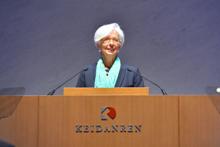
Typical street scene in Santa Ana, El Salvador. (Photo: iStock)
IMF Survey : Lagarde Calls for Reforms to Unleash Economic Power of Women
September 15, 2014
- Pro-female policies can encourage greater labor participation of women
- Middle East, N Africa, S Asia ripe to benefit from high female workforce
- Increasing role of Japanese women could raise income per capita by 4 percent
The global economy could be greatly boosted by unleashing the economic power of women, who remain the world’s largest excluded group, the head of the IMF told a high level gathering in Japan.

‘Excluding women simply makes no economic sense,’ said the IMF Chief, Christine Lagarde at the ‘Women’s Power as the Source of Growth’ seminar (photo: IMF)
WORLD ASSEMBLY FOR WOMEN
“Excluding women simply makes no economic sense—and including them can be a tremendous boon to the 21st century global economy,” the IMF Managing Director Christine Lagarde said in a keynote speech at the “World Assembly for Women” in Tokyo.
She identified three main ways to unleash the economic power and potential of women: change economic policies, change laws and institutions, and change attitudes and culture.
At the symposium “Women’s Power as the Source of Growth” co-hosted by the Japanese government, Japan business federation (Keidanren), Nikkei, and the Japan Institute of International Affairs, Lagarde said “We will need all the economic growth, dynamism, and ingenuity we can get in the years ahead. A key part of the solution is unleashing the economic power of women. Bring the world’s largest excluded group into the fold.”
Economic policies
Countries can lift up women by adopting more pro-female, pro-family approaches, she said. Such policies include moving more from family to individual taxation; providing more affordable child care and parental leave; and providing a flexible working environment.
Lagarde cited examples of economic policies which have boosted female participation in the labor market.
• In Sweden, the country devotes a full one percent of GDP to child care and pre-primary spending—more than most (and three times more than Japan).
• In the Netherlands, female labor force participation rose sharply over the past few decades as part-time work was given the same status as full-time work—the same social security coverage, the same employment protection, the same rules.
• In Chile, female labor force participation rose by 20 percentage points over the past quarter century fueled by large increases in social spending, including on early childhood education, childcare, and longer maternity leave.
Laws and Institutions
Lagarde also cited ongoing IMF research showing that gender gaps are lower when men and women are treated equally under the law—in terms of inheritance, property, and economic opportunity. She noted that, among the issues that seem to matter most here, are “equal property rights for married women” and “women’s freedom to pursue a profession, get a job, or open a bank account—without prejudice or partiality.”
Gender gaps
Eliminating gender gaps in labor force participation can lead to big jumps in income per capita, Lagarde added. “This is true everywhere in the world, but especially in lagging regions like the Middle East and North Africa, and South Asia.”
In Japan, the female participation rate is 65 percent, 20 percentage points lower than for males. This is better than the Asian average, but still low for a member country of the Organization for Economic Cooperation and Development. IMF research suggests that raising Japan’s female labor force to the level of the Group of 7 advanced industrial countries would raise income per capita by 4 percent—permanently.
“The lesson is clear: if we want a strong and bright economic future, then we need strong and bright women to help drive it. That means all strands of society need to embrace inclusion.”
Empowering women
“Female empowerment has particular urgency in Japan, and Japan is growing older at a faster rate than anywhere else in the world,” Lagarde said. Its working age population will fall from a peak of 87 million in the mid-1990s to 55 million by mid-century, she added.
“There is one obvious option for rescuing Japan from this harsh demographic fate—empowering women.’’ Lagarde went on to note that “We all know that Japan’s women are among the highest educated and most talented in the world. We all know that they have the ability, the potential, and the desire to contribute even more.
“Thanks to the great leadership shown by Prime Minister Abe, he and his team have set ambitious targets for empowering women—and I am convinced that they can be met.”


